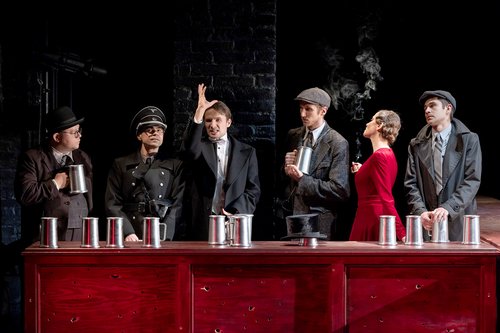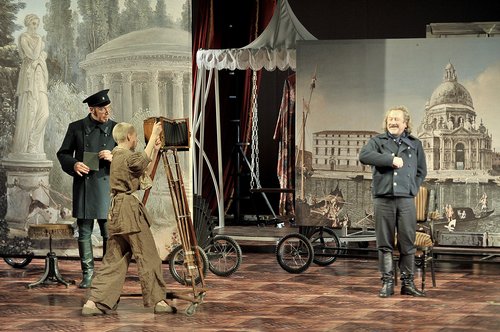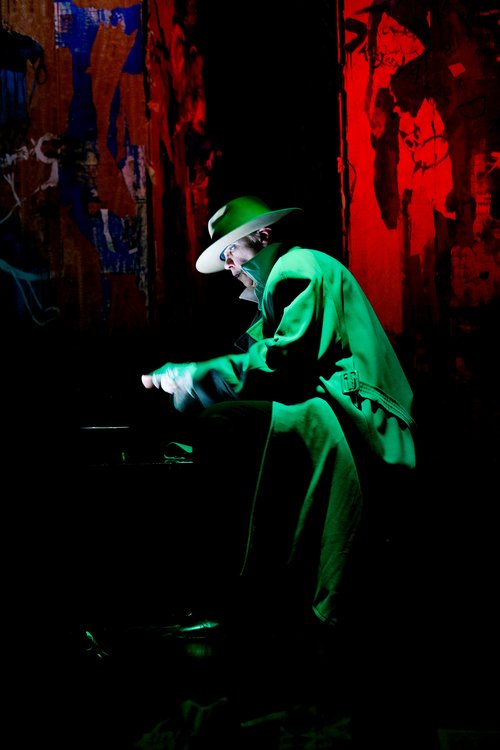Tolstoy Theatre Festival. Yasnaya Polyana, 2024. Photo by Valery Belobeev. Courtesy of the press service of the Tolstoy Theatre Festival
Theatre Festival Takes Over Lev Tolstoy’s Estate
The annual open air theatre festival ‘Tolstoy’, which took place at ‘Yasnaya Polyana’ the writer’s museum estate, was filled with themes of social injustice, death, guilt, and redemption.
The theatre festival at Yasnaya Polyana had a strangely intimate ambience, unusual for an event of its scale, with festival goers, families and thespians strolling around the estate dressed up in their summer best, it looked more like an overgrown private garden party. Indeed, the festival that manages to squeeze one hundred events into a three-day program, is a family affair. The festival’s director is Tolstoy’s great-great-great-granddaughter Ekaterina Tolstaya, while several other members of this crowded and energetic family were also actively involved behind the scenes. Even 87-year-old Marta Albertini, Tolstoy’s granddaughter, flew in from Italy to launch a new book she wrote about her family (with over three hundred direct descendants of the writer now living across the world and every two years, they hold a gathering at Yasnaya Polyana).
The festival’s modus operandi is to throw a large variety of performances in different genres out into the wild – or, rather, into a carefully landscaped estate – and to see what happens. There is always a major production by one of the country’s top theatres on a purpose-built stage, several site-specific performances created by directors during a residency at the estate, and all kinds of shows from promenades to puppet theatre, not necessarily linked to Tolstoy. There are also concerts, lectures, and film screenings.
This year’s highlight was the play ‘Resurrection’ from St Petersburg’s Alexandrinsky Theatre, directed by Nikita Kobelev (b. 1987). An exact copy of the theatre’s stage was built in the park for just two performances, a tradition at the festival so that busy directors from major state theatres do not need to adapt their productions to a new location. Last year, as Leo Tolstoy’s great-great-grandson, writer and journalist Vladimir Tolstoy recalled, an exact replica of the Bolshoi with the dressing rooms and other backstage spaces was constructed in an open field in just two weeks. It hosted the ballet ‘Anna Karenina’ by American-German choreographer John Neumeier (b. 1939). Such extravagancies are funded by the government of the Tula region in central Russia where the estate is located, state-owned VTB bank, and Rostech, a state-run corporation that produces state of the art equipment for private customers and for the army – it has several factories in Tula which has been known as a city of gunmakers since the 18th century.
Кobelev’s adaptation of Tolstoy’s novel premiered in St Petersburg in January 2024, and in July in Yasnaya Polyana it felt uncannily topical. The plot revolves around the fate of a prostitute who has been unfairly encarcerated and the attempts of a guilt-ridden nobleman to save her. In the middle of the stage there is a steel construction that changes from courtroom to prison cell, to parlour, to train carriage; it is even a hermit’s abode. For the protagonist Dmitry Nekhlyudov, played by Viktor Shuralyov (b. 1991) there is no escape from this universal prison, where all the inmates turn out to be innocent victims of a cruel society. “Is there a single person here who has committed an actual crime?” – asks a bemused Nekhlyudov during a visit to a women’s prison cell which resonated eerily with the notorious trial of director Evgenia Berkovich (b. 1985) and playwright Svetlana Petriychuk (b. 1980) which has just reached its climax in Moscow. The day after the Tolstoy festival both women were sentenced to six years in a penal colony. However, in the second act of his production, Kobelev tries to broaden the meaning of the performance past social critique by bringing onto the stage characters from two other short stories by Tolstoy, ‘The Kreutzer Sonata’ and ‘Father Sergiy’. Their protagonists are locked in a prison of their own wild passions – jealousy and lust. The decision seems ambitious, yet controversial: the poignant and powerful message of the original novel gets diluted rather than deepened.
But does contemporary theatre need a stage at all? At the Tolstoy festival, performances take place in every corner of the estate, come rain or shine, and spectators are unobtrusively dragged into action. At ‘Beekeepers’ by St Petersburg director Kirill Lukevich (b. 1994), which verged on stand-up comedy and a biology lecture, members of the audience had to put on beekeepers’ overalls – probably the most entertaining part of the performance – and follow actor Alexander Lutschiy (b. 1970) to the apiary. The threat of being stung by an angry bee added tension to what was a matter-of-factly narrative about bees and Leo Tolstoy’s passion for them. In ‘The Way Home’ by Anastasia Kudiyarova (b. 1999), spectators walked a long way through the fields, their journey getting more and more bizarre. At first, they just witnessed performers make absurd movements, such as trying to climb short ladders pointing to the sky. Then they found themselves performing strange rituals – piling flat stones one upon the other, waving transparent plastic banners, carrying a potted seedling over the bridge to plant it into a soil-filled wicker cradle. During their stroll, they listened to a story about a child who discovers the mortality of all living things by observing the plants in his garden and surrounding woods, loosely based on Tolstoy’s work ‘The Way of Life’ and interviews with Yasnaya Polyana employees.
If not for this repetitive and overly pompous narrative, the whole affair could have turned into a delightfully absurd happening in the style of the Collective Actions group of Moscow Conceptualists – their cryptic ‘actions’ unfolded to a script, yet without any explanation (the group members and spectators created enormous volumes of text after these events, struggling to interpret them post factum.) The creators of ‘The Squire’s Morning’, based on Tolstoy’s eponymous story tried to transplant the Western genre of ‘forum theatre’ onto Russian soil. Seated on tree stumps out in the field visitors tried to help Tolstoy’s well-meaning young nobleman (named Dmitry Nekhlyudov, like the protagonist in Resurrection) to solve the problems of his serfs. It turned out that the perspective of ordinary folk and an educated philanthropist were not easy to reconcile and the lack of empathy between different social strata seemed oddly familiar to the audience. Despite the relaxing ambiance and sunny weather, most performances in the festival program delivered a message of warning, rather than hope. Social injustice is incurable, human nature flawed, universal happiness impossible and death inevitable. The organizers aptly scheduled musical events to the last day, to console disturbed spirits. Pianist Riad Mammadov (b. 1989) improvised French jazz on a small floating stage on the pond, and, at sunset, the Russian National Orchestra performed classical pieces by Glinka, Prokofiev, and Rachmaninoff on the big stage built for Resurrection. Night fell over Yasnaya Polyana, and bats began to flutter over musicians’ heads, oblivious to the sounds of instruments. There was a rustic charm in the scene, but also a hidden threat. Even the best art cannot keep away the creatures of the night.
Tolstoy Theatre Festival















